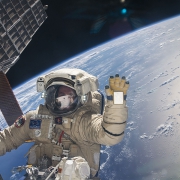ISS schoolcontact met Turnhout, Belgie op dindag 16 oktober om 12:04 UTC, volg de verbinding live via internet
ARISS heeft weer een schoolstation verbinding op het programma staan. Nu met het Sint-Jozefcollege in Turnhout, Belgie. Het contact met Alexander Gerst, KF5ONO, is gepland voor dinsdag 16 oktober om 12:04 UTC. Het contact zal zowel in de Engelse als Duitse taal worden gevoerd. De verbinding met ISS is dit keer een rechtstreekse verbinding, ON4NOK is de operator die hiervoor een compleet grondstation in de school plaatst. De downlink van ISS op 145,800 MHz in FM zal in onze omgeving dan ook goed te ontvangen zijn. Houdt wel rekening met de gebruikelijke doppler verschuiving van -3 tot + 3 KHz.
Tijdens dit contact is er ook een internet stream beschikbaar die de verbinding live weergeeft. Kijk hiervoor op http://on4nok.be/iss-contact-live-stream/
Hieronder volgt nog de introductie van de school en de vragen die door de scholieren gesteld gaan worden.
Bertus, PE1KEH
—————————————————–
School Information:
Saint-Josephcollege is a school situated in Turnhout, in the north of Belgium, in the middle of a green park with a lot of sporting facilities. It consists of 4 schools: kindergarten, 2 primary schools and 1 secondary school. The contact will be made with students of the secondary school and one pupil of the primary school.
It’s a general secondary school with around 750 students (age 12-18), 45% are girls, 55% are boys. Almost 200 of these students live here during the week in the boarding school, which is also part of Saint-Joseph college.
We have different directions at our school (ancient languages, modern languages, mathematics, science, economy, human sciences).
Our school prepares students for higher education, but beside the lessons, as we are a Jesuit school, we think it’s very important to cultivate every student as a single person, letting them taste of all kind of new opportunities, like this contact with ISS.
Students First Names & Questions:
1. Eveliene (11): Is space beautiful or is it just empty and black?
2. Xander (12): Can you describe weightlessness?
3. Jonathan (12): I am worried about climate change. Can you see the impact of this when you look down on earth?
4. Cas (12): Was it your dream to go to space?
5. Matisal (12): If you could travel to Mars, would you do so, even if you knew you couldn’t come back?
6. Franz (13): Can you make music in space, because sound can only travel in air and there is no air in space?
7. Hadrien (13): There is no running water in space. How do you supply enough water?
8. Lore (13): How many degrees Celcius is it in the space station and how many degrees is it outside?
9. Maryam (14): Which experiments do you do on ISS? Which circumstances are not possible down on earth?
10. Alyssa (13): Which experiment did you like the most?
11. Juliette (15): If you do so, how do you make oxygen in space and how do you filter CO2
12. Alicia (15): How did you become an astronaut, or how would one, to your knowledge, go about becoming an astronaut?
13. Friso (15): What is your favourite food in space?
14. Roxanne (16): What do you do in your spare time? Can you follow news and social media?
15. Renaud (16): Do you have trouble adjusting back to earth’s gravity after 6 months in space?
16. Maarten (16): What is, after months of isolation, your relation to time? How do you maintain your biological clock?
17. Lisa (17): What happens when an astronaut gets really ill in space?
18. Emma (17): Do women and men have the same physical challenges adapting to life in microgravity?
19. Bieke (17): Why is it so important to spend so much money on space travel, when we have so many problems like famine here on earth?
20. Wout (17): Wieviel Kilogramm Muskeln werden Sie ungefaehr nach Ihren Aufenthalt auf der ISS verloren haben?
How many kilograms of muscles will you have lost after your stay in the ISS?
21. Pieter (17): Was ist das schoenste der Erde dass Sie aus dem Weltraum schon gesehen haben?
What is the nicest part of earth you have seen in space?
About ARISS:
Amateur Radio on the International Space Station (ARISS) is a cooperative venture of international amateur radio societies and the space agencies that support the International Space Station: NASA, Russian Space Agency, ESA, JAXA, and CSA. The US Center for the Advancement of Science in Space (CASIS) and the National Aeronautics and Space Administration (NASA) provide ARISS special support.
ARISS offers an opportunity for students to experience the excitement of Amateur Radio by talking directly with crewmembers on board the International Space Station. Teachers, parents and communities see, first hand, how Amateur Radio and crewmembers on ISS can energize youngsters’ interest in science, technology, and learning.
The primary goal of ARISS is to promote exploration of science, technology, engineering, and mathematics (STEM) topics by organizing scheduled contacts via amateur radio between crew members aboard the ISS and students in classrooms or informal education venues. With the help of experienced amateur radio volunteers, ISS crews speak directly with large audiences in a variety of public forums. Before and during these radio contacts, students, teachers, parents, and communities learn about space, space technologies, and amateur radio. For more information, see www.ariss.org, www.ariss-eu.org and https://www.amsat-on.be/hamtv-


